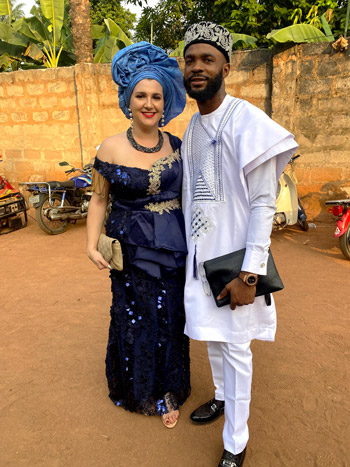Hadassah
Letters to the Editor
Readers Respond: Letters to the Editor

‘Re-Emerging’ Jews
Thank you to Eliana Saks for referencing, in her article “Once Upon a Time in Nigeria” (July/August 2021 issue), the documentary Re-Emerging: The Jews of Nigeria. The film, directed by Jeffrey L. Lieberman, is exceptional. I wish much naches to Saks and thank her for her stimulating article. I have experienced Jewish communities in a number of countries, including Japan and India, but learning about the one in Nigeria was especially heartening. I hope the Igbo Jews will continue to persevere, grow and thrive.
Ruth Heuberger
Great Barrington, Mass.
The Handwritten Word
After reading Dara Kurtz’s essay “Camp Is Not the Hilton Hotel” in the July/August issue, I felt that I had found a kindred spirit. Nothing captures the essence of a person like a handwritten letter.
My closet is filled with several bulky accordion files of cards from relatives, friends and co-workers that I have saved over the years. Most precious of all are notes from my late father, a prolific letter-writer in several languages who “copied” everything he wrote by placing a piece of carbon paper between two blank sheets. I have wishes he sent me on several birthdays, a vote of confidence the morning I was to take my first driving test and words of reassurance the summer my friends and I were terrified by heinous New York criminal “Son of Sam.” And, like Kurtz, I saved correspondence between me and my son when he attended sleepaway camp.
I shudder to think that letter-writing is a feature that will vanish from our shared experience.
Sara Ullman
East Brunswick, N.J.
Coming Forward on Abuse
While I applaud the commitment to “supporting the vulnerable” by Hazzan Alisa Pomerantz-Boro, cited in Rahel Musleah’s article “Childhood Abuse, Adult Reckoning” (July/August issue), it is important to remind ourselves that anyone, child or adult, can be vulnerable to abuse and exploitation by malevolent opportunists, whether because of difficult life circumstances (think a sick child, loss of a loved one, financial difficulties, etc.), or to the powerful wiles of charming psychopaths. Such victims are often silenced by feelings of guilt, shame and self-blame.
Thank you to the Alpert sisters for coming forward with their story and to those in the religious communities who validated their experience and made clear that what was done to them was not their fault and is never O.K.
Janet W. Wohlberg
Williamstown, Mass.
The article “Childhood Abuse, Adult Reckoning” brought to light the horrible and prolonged sexual abuse by a family member and well-known cantor. It’s important to let trusted adults know when abuse occurs and then work toward bringing about justice. But there is a flip side to notifications of sexual abuse. The rabbi at my former congregation was accused of having molested an adolescent girl. Eric Schneiderman, then attorney general of New York, where the abuse allegedly occurred, brought very public charges against the rabbi. An investigation determined the molestation never happened and charges were dropped. But by that time, the congregation’s board and most of the members determined that the rabbi’s contract should be canceled; he was fired. Several of us did not believe that the rabbi was guilty and left the congregation.
When a statement of any type of abuse is made, the accuser should be listened to and an investigation should be made. If the accusation is determined to be true, the abused should be brought to justice. But when there is no evidence of abuse, what is the accused to do?
Lois Zeidman
Tempe, Ariz.
How tone deaf of Hadassah Magazine to print a photograph of Cantor David Putterman flanked by Leonard Bernstein and Max Helfand in the article “Childhood Abuse, Adult Reckoning.” The point of the article was to remove Putterman’s honor and respect from the historical record. That should have precluded printing the photograph that gives him celebrity status by association.
Adrienne Fishman
Acton, Mass.
Cape Cod Bauhaus
As the author of “The Golden Age of Jewish Architects” (Jewish Currents, Fall 2016), I had great pleasure in reading Hilary Danailova’s travel piece on Cape Cod and the prominent role that Jewish scholars and homeowners played in erecting and preserving Bauhaus-inspired houses (“Exploring Cape Cod’s Midcentury Moment,” July/August issue). When the Bauhaus school in Germany announced the importance of bringing design features to all city residents, the school immediately came within the crosshairs of the Nazis. It was one of the first intellectual institutions that Hitler closed upon seizing power. It is good to see that Bauhaus style is alive and well in Cape Cod.
Abbott Gorin
Springfield, N.J.
Restoring Dinah’s Voice
In mentioning The Red Tent in “The Jewish Woman’s ‘Essential’ Booklist” (July/August issue), Sandee Brawarsky, the author of the piece, referred to Dinah as “the daughter of Jacob who, in the Bible, is sexually assaulted by a Canaanite prince.” But Anita Diamant’s novel, told from Dinah’s point of view, was about a love story that did not involve assault. Her brothers decided it was an assault and murdered them all. This is a central tenet of the book—that women are subject to the control and vengeance of the men, regardless of their own desires or wish for autonomy.
Melanie Hill
Woodstock, N.Y.
Immigrant Roots
In her President’s Column “Passing Liberty’s Torch” (July/August issue), Rhoda Smolow states: “With the exception of Native Americans, all of us have immigrant roots.” I do not know whether she is aware that the ancestors of Native North Americans as well as Native South Americans migrated across the Bering Sea ice bridge between Asia and North America many, many centuries ago. Therefore, Native Americans do have immigrant roots.
Lewis Cohn
Springfield, N.J.







 Facebook
Facebook Instagram
Instagram Twitter
Twitter
Leave a Reply